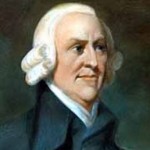There is a great deal of ruin in a nation.
Adam Smith Quotes
As soon as the land of any country has all become private property, the landlords, like all other men, love to reap where they never sowed, and demand a rent even for its natural produce.
Similar Quotes
Each had defended his own country; the Germans Germany, the Frenchmen France; they had don...
- Ernst TollerI thought narcissism meant you loved yourself. Then someone told me there is a flip si...
- Emily LevineLove begins with a smile, grows with a kiss, and ends with a teardrop.
- Augustine of HippoI love everything that’s old: old friends, old times, old manners, old books, old wines.
- Oliver GoldsmithI would like my life to be a statement of love and compassion-and where it isn't, that's w...
- Ram DassComments on: "Adam Smith Quotes: As soon as the land of any country has all become private property,..."
-
The man whose life is spent in performing a few simple operations of which the effects too are, perhaps, always the same or very nearly the same, has no occasion to exert his understanding, or to exercise his invention. He generally becomes as stupid and ignorant as it is possible for a human creature to become.
Topics in Uncategorized -
To found a great Empire for the sole purpose of raising up a people of customers, may at first sight appear a project fit only for a nation of shopkeepers. It is, however, a project altogether unfit for a nation of shopkeepers; but extremely fit for a nation that is governed by shopkeepers.
Topics in Uncategorized

| Birth: | 5th June, 1723 |
| Death: | 17th July, 1790 |
| Nationality: | Scottish |
| Profession: | Economist, Philosopher |
Adam Smith was a Scottish moral philosopher and a pioneer of political economy. One of the key figures of the Scottish Enlightenment, Adam Smith is best known for two classic works: The Theory of Moral Sentiments, and An Inquiry into the Nature and Causes of the Wealth of Nations. The latter, usually abbreviated as The Wealth of Nations, is considered his magnum opus and the first modern work of economics. Smith is cited as the father of modern economics and is still among the most influential thinkers in the field of economics today. In 2009, Smith was named among the 'Greatest Scots' of all time, in a vote run by Scottish television channel STV. After graduating, he delivered a successful series of public lectures at Edinburgh, leading him to collaborate with David Hume during the Scottish Enlightenment. Smith obtained a professorship at Glasgow teaching moral philosophy, and during this time he wrote and published The Theory of Moral Sentiments. In his later life, he took a tutoring position that allowed him to travel throughout Europe, where he met other intellectual leaders of his day. Smith then returned home and spent the next ten years writing The Wealth of Nations, publishing it in 1776. He died in 1790 at the age of 67.
Related Authors
Advertisement
Today's Anniversary - 28th December
Births
- 1981 - Sienna Miller
- 1911 - Sam Levenson
- 1947 - Spencer Bachus
- 1895 - Rose Franken
- 1979 - Noomi Rapace
Deaths
- 2004 - Susan Sontag
- 1950 - Max Beckmann
- 1945 - Theodore Dreiser
- 1963 - A. J. Liebling
- 1963 - Paul Hindemith
Quote of the day
Popular Topics
About Quoteswave
Our mission is to motivate, boost self confiedence and inspire people to Love life, live life and surf life with words.


Share with your friends